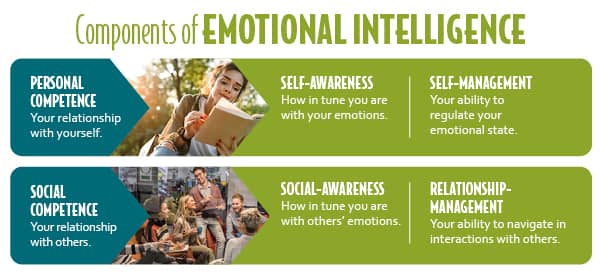While driving home over the Bozeman Pass the other night, I spotted a snowplow lit up like a Christmas tree. For good reason, snowplows want to be seen—too many related accidents. It certainly got my attention in the abyss of a cold, dark night.
People light up, too. Sometimes with joy, other times with anger. People rev up with excitement or shut down with depression. Emotions move us—for better or worse! We can clear the impediments to happy relationships—just like a snowplow moves the snow.
Whether you want to learn to connect deeper with yourself or be more present to your partner, emotional literacy is not just a nice-to-have, someday ability; it's critical for personal and professional growth.
Estimated reading: 6 minutes
 Heartmanity is proud to partner with outstanding companies that we wholeheartedly recommend so this post may contain affiliate links. You can read our full disclosure here.
Heartmanity is proud to partner with outstanding companies that we wholeheartedly recommend so this post may contain affiliate links. You can read our full disclosure here.
What Is Emotional Literacy and Why Is It Important?
We’ve all heard of giving children reading literacy, but what is emotional literacy? And why is it important?
Emotional literacy, a crucial component of emotional intelligence, involves identifying and understanding emotions in yourself and others. It shapes how feelings influence our thoughts and actions. It's the ability to recognize what we're feeling and knowing how to respond effectively in varying situations and relationships.
“While emotional intelligence expresses an innate personality dynamic to be nurtured, emotional literacy is the unity of understanding, strategy, and skills that a person can develop throughout life.”
(Mader, 2005)
Listening to your own personal GPS system, A.K.A. emotions, can help you tremendously. Emotions are simply information; emotional literacy is the ability to read that information for our own benefit and decipher the emotions of others to respond effectively. Being emotionally smart enables you to read people and situations far better.
For instance, you’d probably agree that running a company is no small feat. It requires business savvy and high emotional intelligence to keep it profitable and the doors open, especially in this ever-changing market. So, look at these statistics:
According to a study by TalentSmart, emotional intelligence, also called emotional quotient (or EQ), is responsible for 58% of a leader’s performance and 90% of top performers in the workplace.
Let's take other examples. Most of us have said things in the heat of the moment we regret afterward or we've been hit broadside by someone's intense anger.
Or maybe you have a friend not speaking to you. Perhaps you're among the many couples who argue and fight, unable to handle stress or conflict?
Improving your EQ can turn tense moments into closeness and laughter.
After teaching emotional intelligence for over twenty years, I can confidently say that increased EQ will absolutely create positive changes in your life—I've seen it hundreds of times. Learning emotional intelligence is the cornerstone for emotional well-being.
Now that you know why emotional literacy is so vital, let's explore five essential keys of emotional literacy that, if practiced daily, will make an enormous difference for you.
Emotional Intelligence and Emotional Literacy: A Guide to Thriving
Emotional intelligence (EQ) has become a buzzword in personal development, but back in the 80s when I first learned it, this was an unplowed field of knowledge. Now with prolific brain science and research to back it, there’s no longer any controversy over which is better: intellect or emotions. They are both important.
At its core, EQ includes self-awareness, self-management, social awareness, and relationship management. This crucial skillset enhances your understanding of your emotions and deepens your empathy toward others' feelings.

The greater the emotional awareness, the richer the connection and outcome within yourself and in your relationship with others.
Let’s dig in and give you the big picture and simple ways you can begin today to improve emotional intelligence.
The Journey Inward: Cultivating Deep Self-Awareness
Self-awareness lets you gain insight into your thoughts, emotions, and behaviors. You are able to recognize and understand your temperament, values, preferences, moods, and emotions. You’re cognizant of pesky annoyances and situations that may trigger you emotionally.
This foundational capability helps you assess your strengths and weaknesses better while easily adapting to different situations.
But how do you develop it!?
 Value your own inner experience.
Value your own inner experience.
Enhancing self-awareness involves listening to your internal landscape: What are your thoughts; are they friendly or hostile? What are your feelings telling you? Try to identify the specific emotions you are feeling. By identifying each emotion, you are growing in understanding.
This feedback provides valuable insights; it is a way to acquaint yourself with the many emotions and intensities.
 Journal regularly.
Journal regularly.
Journaling aids self-reflection. This simple practice has been shown to reduce mental distress and increase well-being. Recording your thoughts and emotions helps identify and process them, recognize patterns and triggers, leading to deeper self-understanding.
 Understand your motivation.
Understand your motivation.
Know what drives you. Recognize and honor your intrinsic motivators and fuel yourself by discovering and living your passions. By aligning your actions with your core values, you'll reflect your authentic self more and feel at peace within yourself.
 Seek balance and perspective.
Seek balance and perspective.
Our lives can be very full, even hectic. Therefore, it's vital to periodically step back to gain a clearer or fresh perspective.
Taking time to ground or recenter will help you stay attuned to yourself. Our attunement to ourselves dulls when we are over-tired or stressed.
Pay attention and listen to what your body is telling you. Do you need rest and rejuvenation? Have you forgotten to hydrate or neglected exercise? Are you struggling with an inner conflict that needs to be resolved?
When you listen, this self-awareness will allow you to take illumined action on your own behalf to maintain balance.
 Pay attention to your energy.
Pay attention to your energy.
One of the most telling signs of our well-being is when we are energized or feel joyous. It's helpful to observe yourself and your energy fluctuations throughout the day.
Watch when and why your energy wanes or you feel drained suddenly. If your energy lowers, it's a sign that a person, food, activity, environment, or situation isn't good for you. It can be as simple as a negative thought causing shame.
On the contrary, when your energy goes up, it shows you that you're pointed to your True North. It's like the needle on a compass, your energy guides you to well-being—if you listen.
Unlocking Your Emotional Potential: The Art of Self-Management
To develop strong emotional intelligence, you must possess some essential self-management skills.
We can’t let emotions run our lives if we want to be happy and achieve success. You need to be able to utilize—and direct—your emotions effectively to make good decisions, control impulsive behavior, and adapt to change.
Recognizing the link between feelings and behaviors is crucial for self-management. It requires effectively regulating emotions and taking responsibility for actions.
Ways to Learn Self-Management
Here are some strategies to increase your emotional management and learn to self-manage:
Practice mindful observation.
Mindfulness exercises help you recognize your emotions without judgment, observe your thoughts and feelings in the present moment, and give you better control over impulsive reactions.
Mindful observation is a crucial ability that sharpens with practice.
Take breaks and practice self-care.
Prioritize self-care to replenish energy and promote emotional well-being. Take breaks, engage in hobbies, and practice relaxation techniques to help manage stress and prevent emotional overload.
Practice delaying gratification.
Unconscious behavior is automated and is no longer controlled consciously. A great practice is to slow every choice down and turn our actions into conscious decisions. By delaying our automatic impulses, we strengthen our ability to manage our desires and make positive choices.
When self-managing ourselves, there are many things we can become more aware of and begin to regulate. Below are some of the things you can focus on to raise your awareness:
- Calming strong emotions. Observe the fluctuations of your emotions. Is there a time of day when you're grumpier than others? Is there a person you get easily annoyed with? Does your anger get the better of you and you lash out at your spouse or partner?
- Modulating your use of time. Do you surf the internet or scroll endlessly on Instagram or TikTok? Do you binge on TV series? Do you procrastinate on projects? Are you moving closer to your goals or have they taken a backseat?
- Eating habits. Do you get bored and emotionally eat? Do you overeat and you're overweight? Are you inclined to make poor choices when you're tired or stressed?
- Exercise. Do you go weeks without exercise? Do you overexercise and obsess? Or do you have a healthy, balanced routine?
- Your self-talk. Is your mind constantly criticizing you? Do you experience brain fog or get distracted easily, jumping from one thing to another? Or does your mind race, sometimes keeping you awake at night?
These are all areas where you can grow in emotional literacy and cultivate self-management skills.
Build Bridges: The Power of Social Awareness
Developing social awareness is crucial for understanding the emotional cues and power dynamics of social interactions. It involves recognizing others' emotions and being aware of nonverbal cues that communicate those emotions.
Explore and develop these four key aspects of social awareness:
- Empathy: Cultivating empathy allows you to understand others' feelings and perspectives, deepen connections, and foster compassionate responses.
- Nonverbal cues: Body language, facial expressions, and tone of voice tell you a lot about someone's emotions and can guide you to a better response.
- Communication: Effective communication involves actively listening and expressing thoughts and feelings clearly. By being present and engaged, you can better understand others and express yourself in a way that fosters understanding and connection.
- Social dynamics: Understanding power structures within social groups is essential for navigating social interactions. Knowing how power dynamics influence relationships can help you navigate social situations with sensitivity and respect.
Social awareness is essential. By identifying, understanding, and managing your own emotions, you’ll enhance your ability to understand and respond to others' emotions. Relationships either enhance or detract from the quality of our lives. Here are "5 Ways to Use Empathy and Emotional Intelligence to Improve Any Relationship."

Creating Lasting Connections: Mastering Relationship Management
Interacting with others and building relationships are two of the best ways to expand emotional literacy and emotional intelligence.
The key to forging strong, healthy connections is managing and nurturing relationships, engaging in meaningful communication, and resolving conflicts. At its heart, relationship management is about genuinely connecting with others and transforming good intentions into meaningful actions.
But you have to get out there and talk to people. Mastering relationship management isn't just about understanding social dynamics, but actively engaging in them.
The magic of relationship management lies in deepening connections. You're fully present, genuinely engaged, interested in others and seeking to understand before being understood. However, relationships are a two-way street so you'll also want to speak your mind, too.
This relationship communication is how conflicts become conversations and differences unveil themselves as strengths. By mastering relationship management, you create trust-filled, understanding-based relationships.
You need a blend of empathy, active listening, and clear communication skills to do this.
Embrace Change: The Road to Adaptability
Life moves fast, and your EQ needs to change just as quickly.
Adaptability is the ability to adjust one's emotions, thoughts, and behavior to changing situations and relationships. It allows one to stay flexible when facing challenges, embrace change positively, and navigate complex social dynamics.
Here are the three critical components of adaptability:
- Embrace Change: Develop a mindset that sees change as an opportunity for growth, not a threat. Embrace new situations with curiosity and openness.
- Resilience: Cultivate resilience by learning from setbacks and disappointments. It helps you recover from challenges and maintain a positive attitude.
- Flexible Thinking: Practice flexible thinking to explore different viewpoints and solutions, fostering creativity and innovation, essential for personal and professional development.
Final Thoughts
Embracing the five keys to emotional literacy sets you on a path to becoming more emotionally intelligent — self-awareness, self-management, social awareness, relationship skills, and adaptability.
Ask yourself how improved emotional literacy might transform your personal and professional life in the coming year. How might increased emotional self-awareness change how you respond to stress at work or home?
Investing in your emotional intelligence is investing in a happier life. As you practice these skills, you'll navigate life's challenges with grace, empathy, and understanding—the essence of emotional literacy.
If you want to deepen your emotional intelligence and literacy, try my Emotional Awareness mini-course. This brief sample of the full course costs less than $10 and helps you understand the role of emotions, teaching you to interpret feelings effectively and use them to guide positive actions.
Discover the mini-course here.
Frequently Asked Questions
What are the benefits of emotional literacy?
Boosting your emotional literacy and improving your emotional intelligence offers many benefits.
- A more balanced emotional experience with greater resiliency.
- Greater authenticity and connection to yourself and others.
- Increased self-awareness leads to making more mindful decisions.
- Improved relationship management nurtures stronger personal and professional connections.
- Heightened adaptability ensures that you thrive in an ever-changing world.
What are the objectives of emotional literacy?
When a person develops emotional literacy, the ability enables them to identify their emotions internally and express them appropriately. This understanding is a precursor to effective and meaningful communication. The capacity to identify, acknowledge, and process one’s feelings extends a better understanding of others.








